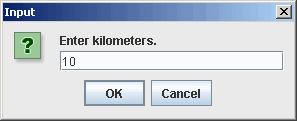Java Notes
Example: Dialog: Kilometers to Miles
This program asks the user for a number of miles and converts it to kilometers.
Dialog Input / Output
Convert String to a number.
We have to convert the input string to a number to do the arithmetic
with it.
This conversion is done by calling Double.parseDouble().
If we had wanted an integer instead of a double, we would have called Integer.parseInt().
Sample dialog boxes from program

|

|
Source code
1 2 3 4 5 6 7 8 9 10 11 12 13 14 15 16 17 18 19 20 21 22 23 24 25 |
// File : examples/dialog/KmToMiles.java
// Description: Converts kilometers to miles.
// Illustrates: Dialog IO for read-compute-write program, named constants.
// Author : Fred Swartz - 2007-01-18 - Placed in public domain.
import javax.swing.*; // Package containing JOptionPane
public class KmToMiles {
//==================================================================== constants
static final double MILES_PER_KILOMETER = 0.621; //Note 1
//========================================================================= main
public static void main(String[] args) {
//... Input
String kmStr = JOptionPane.showInputDialog(null, "Enter number of kilometers.");
double kilometers = Double.parseDouble(kmStr); //Note 2
//... Computation
double miles = kilometers * MILES_PER_KILOMETER;
//... Output
JOptionPane.showMessageDialog(null, kilometers + " kilometers is "
+ miles + " miles.");
}
}
|
Notes
- Constant values are commonly declared static final before the methods are defined. The 'static' keyword will be explained later. If a variable is defined with the 'final' attribute, it's value can't be changed after an assignment to it, which is exactly what you want to do to prevent a constant from being changed.
- You can only do arithmetic operations on numbers in Java, but showInputDialog returns a string. It's necessary to convert the string to a number. Here we convert the string to a double.